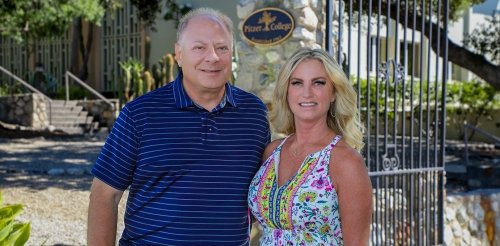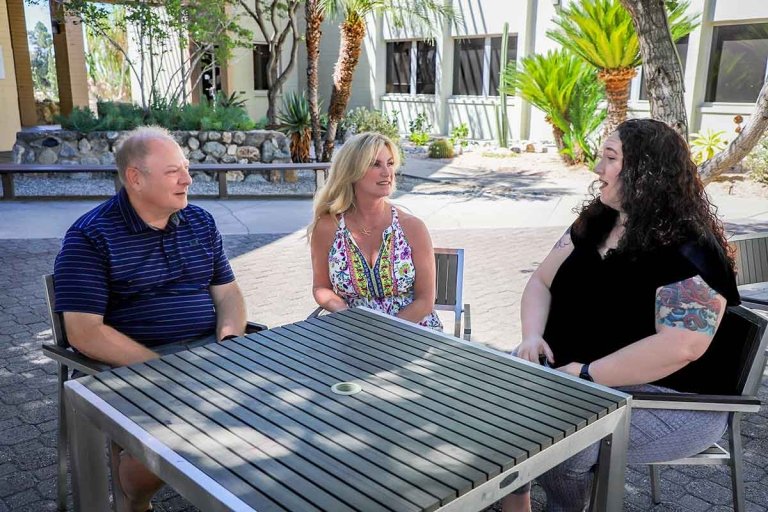Sometimes It's Personal
How a community partnership arose from one mother’s search for help

Kelly Heimdahl ’20 and ConductAbility Founder and President Jim Prust will continue to nurture the partnership between CEC and the organization.
By Lisa Butterworth
For the past 25 years, the Community Engagement Center (CEC) has been helping Pitzer students bring their in-class knowledge into real-life practice with local organizations and communities.
Sometimes, the genesis of a successful partnership works the other way around. Pitzer’s ongoing relationship with Claremont nonprofit ConductAbility is a prime example of how community engagement can organically flourish, and one student in particular, Kelly Heimdahl ’20, helped make that happen.
When Heimdahl first visited Claremont in 2015, she had no idea it was known as “the city of trees and PhDs.” In fact, she wasn’t even familiar with The Claremont Colleges. She was drawn by ConductAbility, a Claremont-based educational nonprofit that serves children and young adults with neuromotor impairments. Heimdahl’s youngest daughter, Savannah, was diagnosed with quadriplegia cerebral palsy; she has little control over her limbs and, despite a wide range of receptive language abilities, is nonverbal. ConductAbility was where Heimdahl wanted her to learn.
Heimdahl also realized that Pitzer was a perfect fit to finish her own undergraduate education as a student in the College’s New Resources program, which enables nontraditional age students 23 and older to get their undergraduate degrees. Today, Heimdahl is preparing to begin Claremont Graduate University’s organizational psychology doctoral program and will continue to nurture the CEC’s ConductAbility partnership.
Heimdahl’s path has not been an easy one. She was raising three young children when her husband died unexpectedly in 2005. Savannah was born the year after, premature and with a brain injury and significant needs. Heimdahl’s mother, who provided some much-needed support, passed away when Savannah was just 1 year old.
From Despair to Action
Though she reached a point of despair, Heimdahl’s never been one to be kept down (her 20 years of recovery from alcoholism are one proof of that). In 2011, she began taking community college courses near her home in Los Angeles’ South Bay and realized that education was the key to providing for her family as a widowed single mom.
When Heimdahl decided to move so that Savannah could enroll in ConductAbility’s program—a change that meant leaving her established support network and building a new one while trying to keep their household afloat—she googled colleges in Claremont.
She connected with Pitzer right away. “I just loved it,” said Heimdahl. “It totally fit. These are my ideals.”
In 2016, at the age of 44, Heimdahl became a Pitzer student; though she majored in anthropology and political studies, it was community-engaged education that caught her interest.
“I was like, ‘Oh, this is the work I want to do.’ The readings and the dialogue and the collaboration on projects that are related to social justice—that’s my jam,” she said. It’s how she ended up at the CEC. “I just went in there and I said, ‘I’m here because of my daughter’s program. And if you’re doing social justice work, there’s a partnership that could be born here.’”
Cultivating Reciprocity

Launched in 2019, the partnership with ConductAbility is one of the CEC’s newer relationships.
“Students were learning about all these wonderful things regarding social responsibility and social justice,” said Tricia Morgan ’08, the CEC’s director. “This provided an opportunity for them to put that knowledge into practice.”
"Our students ... learn from and interact with those who are outside their regular circle of people, and the Pitzer students get exposed to a population of individuals that they might not otherwise be exposed to."
— Jim Prust, ConductAbility's founder and president
The CEC nurtures relationships with community organizations, and Morgan said that ConductAbility was a natural fit to partner with the College. She cited the phenomenal strides that the organization’s students make, “in terms of their ability and confidence and social capacity—it just grows tremendously while they’re in the program.” It also represented a population that the CEC was not yet serving, which created a new opportunity for everyone involved.
“The interplay between the Pitzer students and our students has been really helpful,” said Jim Prust, ConductAbility’s founder and president. “Our students are getting to relate with the Pitzer students. They can learn from and interact with those who are outside their regular circle of people, and the Pitzer students get exposed to a population of individuals that they might not otherwise be exposed to. It becomes a learning opportunity for both, and that’s always a good thing.”
“You’re Never the Same After”
Heimdahl, who is a tireless advocate for Savannah and her peers, knows these individual experiences lay the foundation for systemic change.
“My vision [for the partnership] was exposure. [Savannah] makes people uncomfortable. How do you make policy about someone you won’t look at in the elevator?” Heimdahl said. “There’s a relationship between every student that comes through—you’re never the same after you’ve been in the special needs world for any length of time. And it’s so important to bring people in from the outside because we’re too tired and too few to do anything else besides the fighting that we’re doing to get our kids’ basic needs met.”
In 2022, Morgan became an adjunct professor of organizational studies and made ConductAbility a key partner for the social justice course she teaches.
“My students who have worked there absolutely love it. They have the best experiences; it’s the highlight of their week, every week,” Morgan said. Each volunteer brings their individual strengths to ConductAbility. During the COVID-19 pandemic, Pitzer students researched how compromised communities were being affected around the world. A media studies student made a documentary about Heimdahl and her ongoing struggle to find in-home nursing care for Savannah.
Prust gave another example of a student intern with computer science skills who created an app after helping a student with math homework and realizing how cumbersome the current technology is.
“These are brilliant students,” Heimdahl said. “They do amazing things—from a place of knowing, of being a part of. When you come into the community, you’re in.”
Prust agreed.
“We view this as a long-term ongoing relationship,” he said, “that can foster a lot of positive things for both of us.”